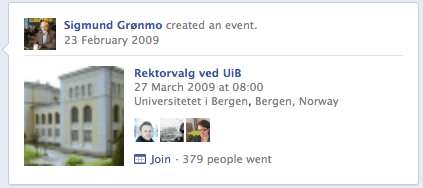Norway’s first university election campaign in social media?

We’ve had a Facebook page for our Atakan for rektor 2013 campaign for, oh, several weeks already (follow us!), and today I saw our opponents, Team Olsen, have set up a Facebook page too. Dag Rune Olsen is already an establisehd blogger and tweeter, so I think we can definitely say that the 2013 rector campaign will be UiB’s first political campaign in social media. (Uh, not quite – see the update at the bottom of this post) I wonder whether it might actually be Norway’s first university leadership campaign in social media?
It’s one thing being a researcher of social media and another thing getting to run a political campaign in social media. OK, so we’re not exactly Barack Obama, we just want to lead the University of Bergen, but we do have to convince around 14,500 students and nearly 3500 scholars and administrators that they should vote for us, not for our opponents. I actually wondered whether there was a book about how to conduct political campaigns in social media, but when I started googling that, I was so comforted to see that we’ve not yet committed any of the 10 worst mistakes political campaigns make on Facebook that I decided we probably already more or less know what we’re doing. We’ll see!
We’re not planning on only campaigning in social media, of course. We’ve already trekked around the university putting paper brochures in as many inboxes as possible:

And of course there will be many meetings with various groups. We’re inviting students to help us write our program on digitalisation, and are meeting with the various faculty leadership groups to hear their concerns, and there will be debate meetings and many other meetings, I gather, as the election draws near.
I think social media are going to matter, though. There are a lot of academics who are not on Facebook, certainly – many of the older and some of the younger professors despise Facebook and all that they think it stands for – or they’re just not that interested. And certainly many of those anti-Facebook seniors may be over-represented among the people who currently run the university.
But more and more of my colleagues are on Facebook. Almost all the students are. I’m pretty sure that the vast majority of academic and administrative staff under 45 or 50 are, and many who are older, too. Certainly most of the PhD candidates are on Facebook.
The way the election system at UiB works, the votes of academic staff count more than administrative staff and students. But there are a lot more students than academic staff. PhD candidates’ votes count as heavily weighted academic staff votes. There are a lot of PhD candidates. Quite probably more than there are professors over 60.
Most importantly, of course, social media allow us to be more present in peoples’ minds, and they allow us to share more information, to speak directly to people, and to allow people who are particularly interested to read all the background material.
Political campaigns and debates in social media don’t necessarily lead to greater voter turnout, because social media allow us to ignore politics just as easily as we can choose to follow it more closely. University staff and students aren’t your typical demographic, though. How will our students and colleagues react to this year’s campaign for the rector election if we and our opponents succeed in running a really engaging campaign in social media?
I’d love feedback – whether you have opinions about how we should focus our campaign, or about what our politics should be! For instance, yesterday a friend pointed out that there were ads on our blog, which I hadn’t noticed because ads aren’t shown if you’re logged in to WordPress. I quickly paid the $30 to remove the ads, and was so glad somebody had mentioned it!
PS: The student politicians have probably already campaigned in social media. I should have paid more attention – tell me about what I’ve missed!
UPDATE:
The candidates for the 2009 UiB rector elections were actually on Facebook too, as it turns out, and thanks to Bjørn Tore Sund for pointing this out on Twitter. Though they weren’t very active! Rolf Reed seems to have had a total of nine posts and 43 likes. He lost the election, but with a fairly narrow margin. 
Sigmund Grønmo, who won, also had a page, and still uses it actively. His page was clearly started up for the election, and though he was a bit more active than Reed (with 16 election-related posts) he was far from a daily poster, and there is very little evidence of discussion of shared links. Cunningly enough, Grønmo set up a Facebook event for the election itself, with 379 people saying they would attend. I’m thinking a non-partisan Facebook event created by UiB itself would be wiser this time round…

Related
Discover more from Jill Walker Rettberg
Subscribe to get the latest posts sent to your email.


